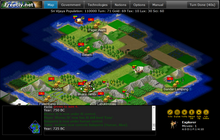Browser game

A browser game is a computer game that is played over the Internet using a web browser.[1] Browser games can be created and run using standard web technologies[2] or browser plug-ins. Browser games include all video game genres and can be single-player or multiplayer. Browser games are also portable and can be played on multiple different devices or web browsers.[3]
Characteristics
Browser games are often free-to-play and do not require client software to be installed apart from a web browser. Since they do not have the same level of graphical or audio technology as commercial games, browser games have a greater focus on gameplay. Multiplayer browser games have an additional focus on social interaction, often on a massive scale. Due to the accessibility of browser games, they are often played in more frequent, shorter sessions compared to traditional computer games.[4]
Since browser games run isolated from hardware in a web browser, they can run on many different operating systems without having to be ported to each platform.[5]
Technologies
Browser games can take advantage of different technologies in order to function.
HTML
Standard web technologies such as the Document Object Model, CSS, and JavaScript can be used to make browser games. These technologies, collectively termed dynamic HTML, allow for games that can be run in all standards-compliant browsers.[6] In addition, dedicated graphics technologies such as SVG and the Canvas API allow for the fast rendering of vector and raster graphics respectively.[7]
Future technologies such as WebGL will also allow for accelerated 3D support in the browser without the use of a plug-in.[8][9]
Browser plug-in
Browser plug-ins provide additional capabilities to web browsers[10] and can provide support for features that are not yet provided by standard web technologies.[11] For example, plug-ins provide accelerated 3D computer graphics using O3D[12] or physics and audio processing using Unity.[13]
Server-side
Server-side scripting languages such as PHP can be used to create browser games.[14]
Comparison of client technologies
The following table compares general information for notable browser game client technologies.
See also
- List of browser games
- List of multiplayer browser games
- Multiplayer game
- Massively multiplayer online game (MMOG)
- Online game
- Online skill-based game
- Online word game
References
- ^ D Schultheiss: Long-term motivations to play MMOGs: A longitudinal study on motivations, experience and behavior, page 344. DiGRA, 2007.
- ^ http://www.w3.org/standards/webdesign/graphics#uses
- ^ http://www.pbbg.org/default.asp
- ^ C Klimmt: Exploring the Enjoyment of Playing Browser Games, page 231. CyberPsychology & Behavior, 2009.
- ^ E Adams: Fundamentals of Game Design, page 80. New Riders, 2009.
- ^ http://www.downes.ca/post/276
- ^ http://www.w3.org/standards/webdesign/graphics#uses
- ^ http://www.downloadsquad.com/2009/12/11/3d-browser-apps-and-games-creep-ever-closer-with-the-webgl-draft/
- ^ http://googlewebtoolkit.blogspot.com/2010/04/look-ma-no-plugin.html
- ^ http://www.boutell.com/newfaq/definitions/plugin.html
- ^ http://arstechnica.com/open-source/news/2009/08/webgl-standard-to-bring-3d-web-without-browser-plugins.ars
- ^ http://news.cnet.com/google-tries-jump-starting-3d-web-with-o3d/
- ^ http://arstechnica.com/apple/news/2010/04/apple-takes-aim-at-adobe-or-android.ars
- ^ A Mulholland: Programming Multiplayer Games, page 57. Wordware Publishing, Inc., 2004.
- ^ a b c "Web Browser Plugin Market Share / Global Usage". Statowl.com. Retrieved 2010-04-08.
- ^ "Shockwave Player Adoption Statistics". Adobe. Retrieved 2010-04-08.
- ^ "Unity Technologies Blog » Blog Archive » Thoughts On Browser Plugin Penetration". Blogs.unity3d.com. 2008-03-31. Retrieved 2010-04-08.
